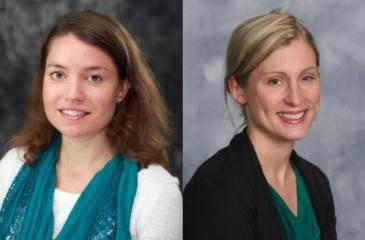Researchers from the University of Minnesota and Children’s Hospitals and Clinics of Minnesota are collaborating on a study that explores a new approach for connecting food insecure families with food and nutrition resources, thanks to funding from CTSI, Children’s Hospitals and Clinics of Minnesota, and the University’s Department of Pediatrics.
“Food insecurity has been linked with poor dietary outcomes, which lead to a higher burden of chronic health conditions like obesity and diabetes,” says Caitlin Caspi, ScD, University of Minnesota Department of Family Medicine and Community Health. “This grant will help us find better ways to connect households experiencing food insecurity with food and nutrition resources in the community.”
Dr. Caspi, and Dr. Gretchen Cutler, PhD, MPH, Program Director of Emergency Department Research at Children’s Hospitals and Clinics of Minnesota are teaming up to conduct the research through a $200,000 Child Health Collaborative Grant Award, which supports collaborations between researchers at the University of Minnesota and Children’s that address important, unmet child health issues in Minnesota.
“The same factors that increase risk for food insecurity in children -- such as poverty, public insurance, and low parental education -- are also associated with higher emergency department utilization,” says Dr. Cutler, who is also an affiliate assistant professor in the University’s Department of Epidemiology and Community Health. “The majority of patients at Children’s emergency departments come from low-income families and include many immigrants and refugees, who bear a disproportionate burden of food insecurity.”
The research project is a collaboration among Children’s Hospitals and Clinics of Minnesota, University of Minnesota Medical Center (UMMC), and Hennepin County Medical Center (HCMC). The team will first identify food insecure families through a two-question screening incorporated into the Electronic Medical Record (EMR) as part of patients’ care in the Pediatric Emergency Departments of Children’s Hospital (St. Paul and Minneapolis).
Researchers will then test through a randomized controlled trial whether a text-messaging-based system focused on improving connection to community resources helps improve satisfaction with medical care, reduce emergency department readmissions, and ultimately increase the level of food security among these families.
Text messages would direct people to relevant resources such as Bridge to Benefits, the Minnesota Food HelpLine, Supplemental Nutrition Assistance Program (SNAP), the Special Supplemental Nutrition Program for Women, Infants, and Children (WIC), community food shelves, and feeding programs.
“This research project -- through funding from this unique collaborative grant program -- will create a partnership between the largest providers of pediatric care in Minnesota, and ultimately may produce a model to help improve care and outcomes for food insecure Minnesotans across every healthcare setting in the state,” said Dr. Mark R. Schleiss, University of Minnesota Child Health Collaborative Grant Award program lead, Professor and Director, Division of Pediatric Infectious Disease and Immunology, Pediatrics Department, Medical School.
“This is an exciting opportunity for both Children’s Hospital and the University of Minnesota to explore an innovative approach toward eliminating the scourge of food insecurity which exists throughout our community,” says Camerone Bey, Director, Research and Sponsored Programs, Children’s Hospitals and Clinics of Minnesota. “Dr. Cutler and Dr. Caspi are uniquely qualified to conduct this type of research, having both had experience investigating ways to produce better outcomes using evidence based models to explore these options.”
The results of the project titled, Evaluating an EMR-based process to identify and reduce food insecurity among pediatric emergency department patients and improve community resource utilization, will be included in an R01 grant application so the researchers can further examine the efficacy of an EMR-based screen to identify food insecure patients in other clinical settings.
Congratulations Drs. Caspi and Cutler!
This research is funded in part by the University of Minnesota’s Clinical and Translational Science Institute (CTSI), which is supported by the National Center for Advancing Translational Sciences of the National Institutes of Health Award Number UL1TR000114. Funding is contingent on approval from the NIH's National Center for Advancing Translational Sciences.
